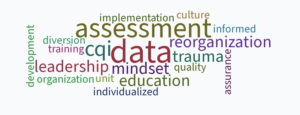On Thursday, January 27th, 2022, the Robert F. Kennedy National Resource Center for Juvenile Justice virtually convened forty representatives from six project sites to celebrate community supervision system improvement successes and share lessons learned. Using Second Chance Act funds, OJJDP funded the Dennis M. Mondoro Probation and Juvenile Justice System Enhancement Project. Six sites were selected to receive tailored training and technical assistance from the RFK National Resource Center for Juvenile Justice. The project helped these sites incorporate adolescent development into their practices, screen for and treat trauma, and identify effective alternatives to formal involvement in the juvenile justice system. When asked, “Using one word, which change has been the most impactful for your jurisdiction during the Mondoro Project?,” participants responded with data, assessment, leadership, reorganization and many more.

Incorporating multiple digital tools, including Jamboard and Poll Everywhere, and encouraging participation in a pre-convening survey, enabled participants to make meaningful connections. Through this collaboration, four themes emerged as the most impactful: Adolescent Brain Development, Risk-Need-Responsivity, Change Management, and Quality Assurance / Continuous Quality Improvement.
Site representatives shared their new focus on adolescent brain development, which included developing training curricula for staff and expanding their training offerings to law enforcement, the judiciary, and attorneys; updating their policies using language and philosophies reflective of current knowledge about brain science; and incorporating trauma tools into their processes. For example, In King County, Washington, court staff are administering a universal trauma screening within the first 15 days of case assignment. Collectively, the jurisdictions’ system improvements led to more fair and compassionate treatment of youth.
Another theme that emerged was commitment to a risk-need-responsivity (RNR) approach. As a result of increasing use of risk assessment tools in a consistent manner to inform individualized case planning and decision making, multiple sites realized a decrease in caseload sizes and an increase in the use of diversion. For example, by committing to an RNR approach, Lancaster County, Nebraska realized a 32% increase in early case closures, and a 14% reduction in recidivism. And, Fairfax County, Virginia moved to a bifurcated adjudication and disposition process to ensure dispositions were informed, targeted and equitable.
One of the greatest takeaways from project participants and consultants was shared recognition that true transformation is like a marathon, not a sprint. It is important to take time, communicate, and be willing to course correct. Sites shared that applying change management science, early on, is critical to the success of reform efforts. Sustainability relies on the development of strong quality assurance and continuous quality improvement efforts, supported by data from each local jurisdiction. Some sites established research units and quality units to support this goal.
The experiences shared by the participating sites during the convening will inform the project’s findings and will be shared to inform and inspire other jurisdictions seeking to improve youth outcomes and system performance. Following the event, RFK National Resource Center Executive Director, John Tuell, told the sites, “Our belief was reaffirmed that your work will inspire others to undertake this cause and replicate your successes on behalf of youth and families across the nation.”
//////
The Dennis M. Mondoro Probation and Juvenile Justice System Enhancement Project is supported by Grant # 2018-CZ-BX-K002 awarded by the Office of Juvenile Justice and Delinquency Prevention, Office of Justice Programs, U.S. Department of Justice. The opinions, findings, and conclusions or recommendations expressed in this announcement are those of the author(s) and do not necessarily reflect those of the Department of Justice.
